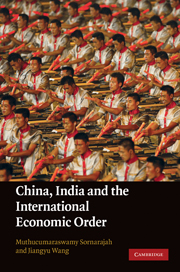Book contents
- Frontmatter
- Contents
- Notes on contributors
- Preface
- Introduction and overview
- PART I China, India and the global trade system
- PART II China, India and regional economic integration in Asia
- 10 The role of China and India in Asian regionalism
- 11 The Asian Economic Community
- 12 The China–ASEAN tariff acceleration clause
- 13 Financial cooperation and integration in East Asia
- PART III Law and development in China and India: Domestic issues
- Index
- References
10 - The role of China and India in Asian regionalism
from PART II - China, India and regional economic integration in Asia
Published online by Cambridge University Press: 03 May 2011
- Frontmatter
- Contents
- Notes on contributors
- Preface
- Introduction and overview
- PART I China, India and the global trade system
- PART II China, India and regional economic integration in Asia
- 10 The role of China and India in Asian regionalism
- 11 The Asian Economic Community
- 12 The China–ASEAN tariff acceleration clause
- 13 Financial cooperation and integration in East Asia
- PART III Law and development in China and India: Domestic issues
- Index
- References
Summary
Introduction to regional economic integration and regionalism
The conceptual definitions
Regionalism, regionalization, regional economic integration, regional economic cooperation, regional trade agreements, free trade agreements …, terms like these appear frequently in newspapers, academic articles and official documents when international trade, investment or finance is concerned. In essence, they all refer to one phenomenon: the cross-border preferential economic initiatives undertaken by national governments or private sectors at regional or bilateral level, as opposed to multilateral initiatives which are conducted on non-discrimination basis under the auspice of the World Trade Organization (WTO).
Although these terms can be understood loosely and used interchangeably, it is important and useful to distinguish one term from another conceptually. Winters, when discussing the regionalism v. multilateralism debate, defines regionalism ‘loosely as any policy designed to reduce trade barriers between a subset of countries regardless of whether those countries are actually contiguous or even close to each other’. According to Lamberte, regionalism shall refer to ‘formal economic cooperation and economic arrangements of a group of countries aimed at facilitating or enhancing regional integration’. Regionalism is to be distinguished from regionalization, which is ‘market-driven integration, spurred by unilateral reforms in individual economies within a particular region’.
- Type
- Chapter
- Information
- China, India and the International Economic Order , pp. 333 - 386Publisher: Cambridge University PressPrint publication year: 2010

